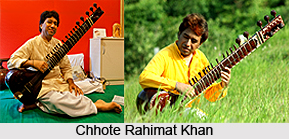 Chhote Rahimat Khan was a legendary sitar player born in the year 1959. He belonged to the Gharana of Bande Ali Khan (beenkar). He received his early training in music from his father - Abdul Karim Khan, and grandfather, Ratna Rahimat Khan, as well as his older brothers.
Chhote Rahimat Khan was a legendary sitar player born in the year 1959. He belonged to the Gharana of Bande Ali Khan (beenkar). He received his early training in music from his father - Abdul Karim Khan, and grandfather, Ratna Rahimat Khan, as well as his older brothers.
Ustad Chhote Rahimat Khan, for many years now, has been the Head of the Sitar Faculty at Kala Academy located in Goa. He has also given many public performances in many festivals in European and Asian nations. Apart from concerts in India, he also performed in the UK, Portugal, China, France, Finland, Malaysia and Singapore.
Early Life of Chhote Rahimat Khan
He belonged to the seventh generation of musicians and received training from his father, Ustad Abdul Karim Khan, although he has also benefited from the influence of his legendary grandfather, Sitar Ratna Rahimat Khan. Ratna Rahimat Khan, a disciple of the great master, Ustad Bande Ali Khan, was a player of Rudra Veena and sitar who was immensely responsible, not only for modifying the three-string sitar to the seven-string instrument that are used in modern times, but also for reunifying the instrumental khayal of the Gwalior Gharana with the instrumental dhrupad of Gwalior.
It is this inimitable legacy that gives his music a unique and distinctive colour rarely experienced in modern music circles. His music is a sonorous blend of both Gayaki Ang that looks to reproduce the nuances of human voice and tones on the instrument, and Tantakari Ang, the more conventional instrumental style played on the instrument.
Recognition and Achievements of Chhote Rahimat Khan
For a competition held in Dharwad in 1978, Rahimat Khan at the age of 19, secured second prize in the All India Radio Music Competition, he also won the first award in the preliminary and final round of the Yuva Sangeet Nrithya Mahotsav organized by the South Central Zone Cultural Centre at Nagpur on 6th October 1987. He is a regular artist on AIR Dharwad and All India Radio, Panaji, Goa.
Music Direction by Chhote Rahimat Khan
Apart from various musical contributions, he also worked as a music director. He scored music to Vadhachakra, the first Marathi film of Goa, in 1992, and also to Tulsi, a Konkani Telefilm, in 1994. He has also scored live music for one of Kalidasa`s plays, Abhidnyan Shakuntal, staged by Professor Kamalakar Sonatakke, on 16 and 17 December 2005.




















